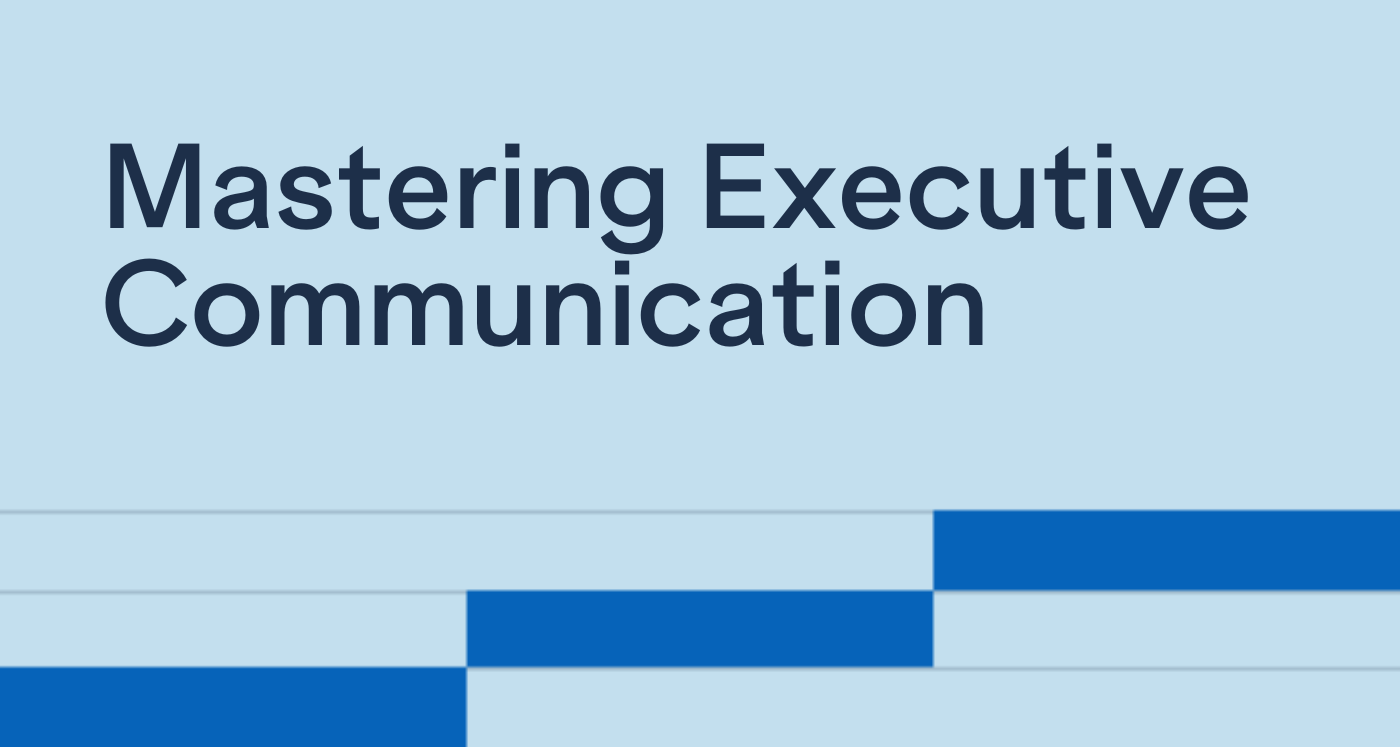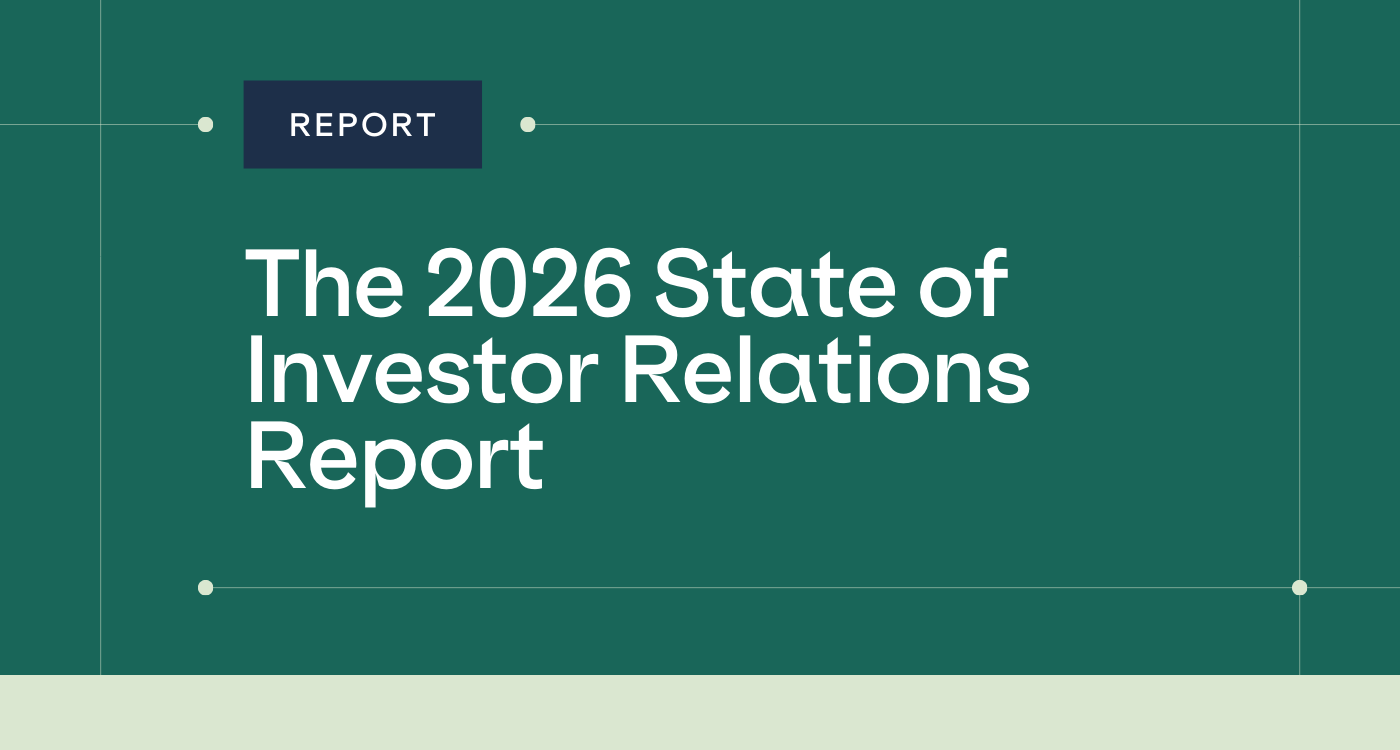
Mastering Executive Communication: Insights from David Calusdian on Effective Investor Relations
Effective investor relations extends far beyond crafting compelling messages. Learn how the experts deliver their story strategically.

To create value for the whole organization, IROs must lead through influence and foster strong relationships with internal and external stakeholders. So, what skills do IR professionals need to develop to be successful?
To answer this question, we enlisted the help of Rebecca Gardy—Senior Vice President and Chief Investor Relations Officer at Campbell Soup Company. With extensive IR experience at world-class organizations such as Nike, Popeyes, Green Sky, and KPMG, Rebecca is an accomplished leader who can write the playbook for leading through influence.
Rebecca’s blend of finance, marketing, communications, and entrepreneurial experience has also helped her build a unique perspective on balancing the art and science of an IR role.
Continue reading to learn more about the most important skills Rebecca believes an IRO should have and how you can use them to build relationships and create influence within your organization.
IR professionals are often viewed as advisors to not only an organization’s CFO and CEO but also various division leaders within the business. Because of this, the responsibilities of an IRO are extensive, requiring technical and interpersonal skills.
For IROs looking to grow their qualifications, it’s essential to understand what these two separate skill sets entail. Let’s break them down:
Technical and analytical skills in financial and data analysis, capital markets, regulatory compliance, financial communication, and investor targeting are critical in IR. These qualifications help IROs navigate complex economic landscapes, provide accurate and insightful information to investors, and ensure regulatory compliance while effectively communicating the company's financial performance and strategic initiatives.
An important IR skill is a solid understanding of the organization, the business model, and any profitability drivers. Rebecca states, "IR professionals need to be capable of connecting the dots between the strategy of their business and how it shows up in the financials.”
Technical qualifications also include conducting financial analysis, building a solid knowledge of the financial metrics that a company will disclose, and understanding the underlying drivers. An IRO must understand what may be causing changes in those metrics so they can provide—and articulate—insights into the company's performance.
This requires an IRO to constantly ask questions to ensure they’re making intelligent decisions and drawing the correct conclusions. Rebecca explains that “it's similar to being an investigative reporter. IROs must look at the underlying whys and hows behind the metrics.”
IROs must also be able to anticipate any questions they may be required to answer in the future. IR professionals should constantly look around the corner to have a solid knowledge of what’s next for the organization—and their strategy.
Rebecca suggests that a working knowledge of relevant security regulations, disclosure and compliance requirements, and insider trading laws will positively affect an IROs success. “What’s likely even more important is knowing what you don’t know,” Rebecca states. “Reaching out to the experts in those fields when you aren't sure of the answer, or you're not sure how a metric is defined, or even where the boundaries are of what you can disclose is a skill IROs should ensure they master.”
By leveraging these skills, IR professionals can improve investor confidence and foster meaningful relationships.
Aside from technical skills, IROs must hone their strategic thinking capabilities. Effective communication, conflict resolution, and stakeholder management skills are vital because they enable IR professionals to build and maintain positive relationships.
IROs should first aim to fine-tune their communication skills. It’s necessary to not only deliver positive results but also less-ideal news intelligently. Clear and timely communication with executive leadership and other shareholders and navigating external crises are significant skills to hone as an IRO.
Another crucial area to focus on is influencing and leading others in the organization. Leadership skills are pivotal in IR for establishing trust, facilitating effective communication, managing relationships, handling crises, and driving strategic thinking.
IR professionals are often sole contributors, so rather than lead through direct reporting, it’s done through influence—which can be challenging to do effectively.
Rebecca explains that “it requires IROs to build strong, deep relationships with internal and external connections. That ability to lead through influence and build solid, cross-functional relationships is one of the most important qualities, in my opinion.”
These skills contribute to building a strong and positive image of the company in the industry, attracting (and retaining) investors, and ultimately supporting the company's overall success.
Building influence as an IRO requires a combination of financial acumen, effective communication, strategic planning, staying ahead of market trends, and collaborating with internal and external stakeholders.
But an IRO's relationship-building skills may have the most impact on influence. “We have relations in the role title,” explains Rebecca. “So building those relationships will allow IR professionals to influence the direction of the company and its strategy.”
IROs can also influence their organization by demonstrating value to internal teams. One example Rebecca provides is distilling and synthesizing peer earnings reports and mapping them to the company’s corporate strategy in an additive way for other business units.
Remember, other departments may not be as financially savvy as IR, so interpreting data from transcripts or investor presentations can be an easy win. The more you show that you're adding value, the more significant your impact will be, and other stakeholders will look to you for guidance because of it.
When managing relationships with internal stakeholders, active listening is key.
IROs need to be self-aware enough to adapt their communication style and tone to ensure they provide clear responses while addressing concerns. For Rebecca, she operates on a “give and take” model with her internal stakeholders. This means being present and providing value.
“I don't think you can swoop in three weeks before the quarter-end to ask for various analyses and then disappear until the next earnings call. I aim to give a lot back to my constituents, whether they're internal or external. It’s important to keep the dialogue active throughout the quarter.”
With a solid internal network, success in IR will be easier to obtain. IROs need to ensure they’re helpful throughout the quarter and not only when they need support from stakeholders. By being present and delivering value, IROs can better manage internal audiences with different priorities than their own.
Developing skills as an IRO requires a combination of continuous learning, practical experience, and professional development. It’s an ongoing process that requires IR professionals to be proactive.
First and foremost, having a solid foundation in finance is fundamental to skill development in IR. “You’re doing yourself a disservice if you don’t have a solid grounding in the language and the vocabulary of finance,” Rebecca explains.
Rebecca also subscribes to the notion of 70/20/10—a balance of three separate skill-development paths.
Seventy percent comes from active experience, on-the-job learning, and being immersed in the business.
“As IROs and IR professionals, we have a unique license to ask questions across the entire organization. There is no requirement to stay in your lane in IR because your lane is 360 degrees around. While I may report the company's performance one-inch deep, I need to know it several feet deep. This gives me license to learn from actively experiencing the company.”
The 20% in Rebecca’s development model is the knowledge IR professionals can obtain from leaning on others in the industry. IROs must recognize the vast amount of knowledge that can come from networking and sharing best practices. “The IR community has proven invaluable to me,” Rebecca states. “NIRI, fellow IROs, and partners such as Irwin are instrumental in helping to understand what other IROs are doing.”
The final 10% in this skill-development equation is education. Whether it's formal classes, studying transcripts and presentations, conferences, watching webinars, or listening to podcasts, IR professionals should constantly welcome new learning opportunities.
Investor relations sits at the intersection of finance and communication. Success requires IROs to have equal parts technical expertise and communication skills.
But how can IR professionals balance both of these necessary foundational skills? Rebecca shares three practical tips:
Your messaging will differ if you speak to a high-turnover hedge fund or a long-only growth-oriented investor. So IROs must first understand who they are talking to and what information and communication style will be relevant to that particular audience. This may also require modifying vocabulary, tone, and the method of communication.
Having the technical expertise to decipher what your audience is asking is essential to success in IR. It’s not enough to simply hear the question—listen carefully. What is your audience trying to understand? Have they asked the same question multiple different times? IROs can improve their narrative by actively listening to their stakeholders.
IR professionals bring unique expertise to their role, as they are storytellers to internal and external stakeholders. Every IRO should be able to see the bigger picture of their organization while ensuring the story they tell to various audiences is concise and without any variances. This helps maintain industry credibility and ensures IROs positively influence their organization’s reputation.
From changing regulatory environments to fluctuating market conditions, IROs need to navigate a constantly evolving narrative—and this is where skills development and relationship-building are so crucial. The best way to navigate challenging environments is to learn to stay the course and manage expectations internally and externally.
The biggest external challenge is to hold steadfast and communicate long-term strategy when everyone focuses on short-term or near-term volatility. Internally, the challenge is to find ways to stay relevant among your peers. Providing insight to the internal team on how the company navigates external perceptions is incredibly valuable.
"IROs should address any short-term challenges but stay focused on the company’s long-term goals. Leverage what you've said in past quarters, but continue to look ahead. Otherwise, you'll no longer be able to manage internal and external stakeholder expectations effectively.”
Building a career in IR requires a combination of education, experience, and developing critical skills. For those at the beginning of their careers, Rebecca recommends:
Listen to Rebecca Gardy's full Winning IR episode for more advice on how IR professionals can lead through influence.
IR Experts weigh in on the topics that matter most to you.

Effective investor relations extends far beyond crafting compelling messages. Learn how the experts deliver their story strategically.

Across geographies and market caps, one theme is consistent: IR is entering a period of recalibration. Learn what's changing in 2026.

Learn how seasoned IR veterans are executing targeting strategies for small-mid-cap companies.